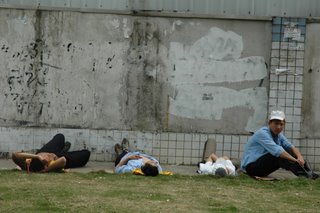Multinationals have long blamed abuses of workers in their factories in China on the peculiarities of the country’s political system, arguing—quite rightly—that the Chinese government, especially at the local level, does not do enough to enforce its own laws, which are in turn argued to be too vague.
However, faced with the prospect of real labor rights regulation, the same companies who once talked so earnestly about rule of law have balked. Many corporations have joined a protest against draft revisions to the Labor Contract Law of the People’s Republic of China, which would restrict corporations’ ability to hire temporary, un-contracted workers, expand the ability of unions to negotiate working conditions, and most importantly, apply tough criminal penalties to sweatshop bosses.
Shoe giant Nike, for example, used to argue that “it is not realistic nor wise” to demand that companies divest from nations like China that do not have strong collective bargaining traditions. According to Nike, “It is more effective to stay invested in these countries and build greater recognition for these rights.”
This is an entirely reasonable position. Yet the American Chamber of Commerce in Shanghai, of which Nike is a member, objects to the new Contract Law because, “It is not feasible to state that an employer’s regulations and policies shall be void if they are not adopted through negotiation with the trade union.”
In other words, unions are great in theory, as another bullet point on some vague, aspirational “corporate code of conduct”— just not when you have to actually negotiate with them.
The Chamber of Commerce even lectures Beijing, like some wise elder brother, “National legislation would better not to be too detail-oriented. And it would be better for local authorities to work out such details according to local situations.”
Weren’t companies saying that the laws were too “loose” and varied before? And aren’t local authorities precisely the ones that supposedly can’t be trusted with formulating and fairly administering the law?
The real issue at stake here is not this one law, but who gets to shape the moral community of the shop floor—capitalists alone, or capitalists alongside labor and the state? What is “fair”? What is a “rational” way of doing business?
Multinationals have warned that the Labor Contract Law means a return to the labor-management relations that prevailed under China’s old planned economy.
Would this be such a bad thing?
There certainly were not enough incentives in the Mao era. Workers enjoyed virtually guaranteed lifetime employment at factories, regardless of their performance.
And until the 1980s, employees were locked in tight patron-client relationships that Alexander Walder, in a pioneering study, described as “Communist neo-traditionalism.”
Yet because of the close-knit nature of socialist-era factory life, workers also commanded a strong voice in plant decisions. And they had to be treated with a minimum of dignity for the whole, precarious system, based on campaigns and slogans, to function.
It is this reciprocity, the idea that a corporation can’t just plow ahead but must rally workers behind its proposals, that companies are fighting against in China—and in other parts of the world.
The Chinese government should not bend to the Chamber of Commerce’s pressure. Most of these big shots will not leave China if the law is enacted, despite their threats—the law is not really all that harsh and China has many pluses in its favor like solid infrastructure and relative political stability.
Those companies that do leave will make way for progress. China cannot compete forever for the bottom rung of the wage ladder if it wants to boost consumption at home. The country must follow the lead of cities like Shanghai in attracting high-skilled and high-paying blue collar jobs.
This will require a changed education policy, new investment incentives… and stronger worker protections like the draft Labor Contract Law.
 The English-language China Daily reports that the National People's Congress has put off a vote on the second draft of the country's new Labor Contract Law (see Vote on labour contract law put off). According to the article, the postponement came--in part--as a result of strong opposition from employers' groups.
The English-language China Daily reports that the National People's Congress has put off a vote on the second draft of the country's new Labor Contract Law (see Vote on labour contract law put off). According to the article, the postponement came--in part--as a result of strong opposition from employers' groups.















